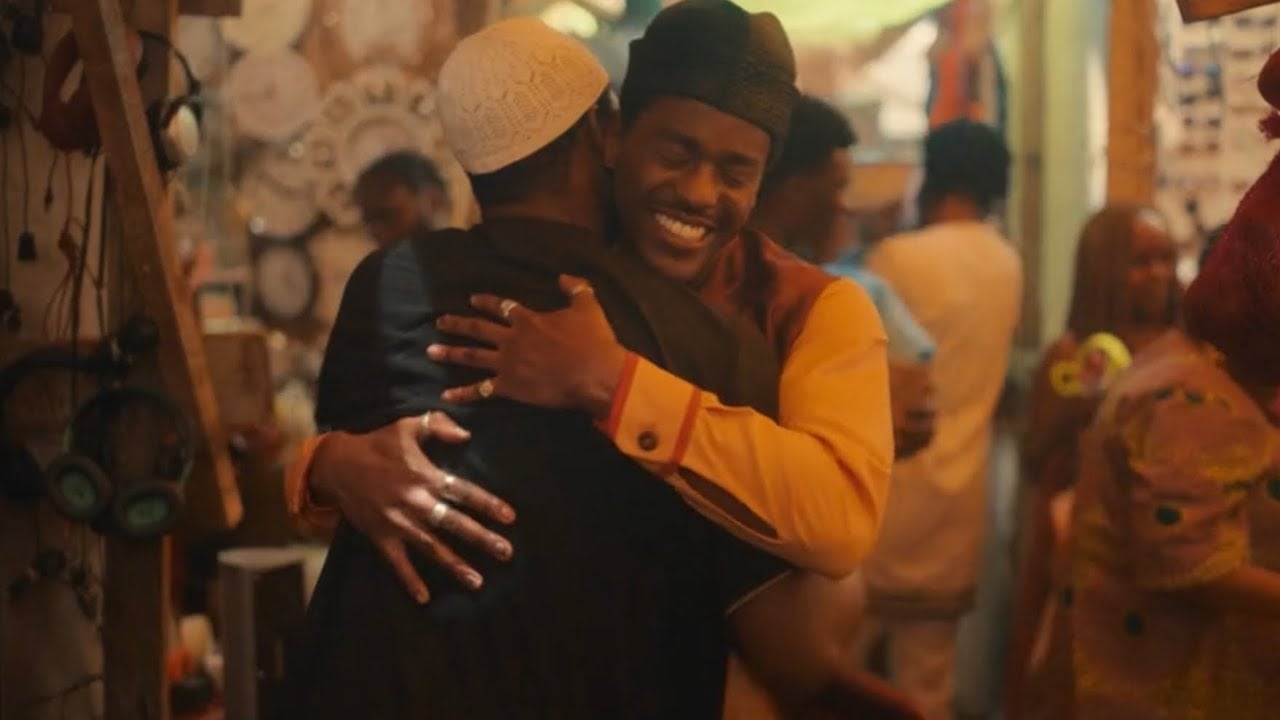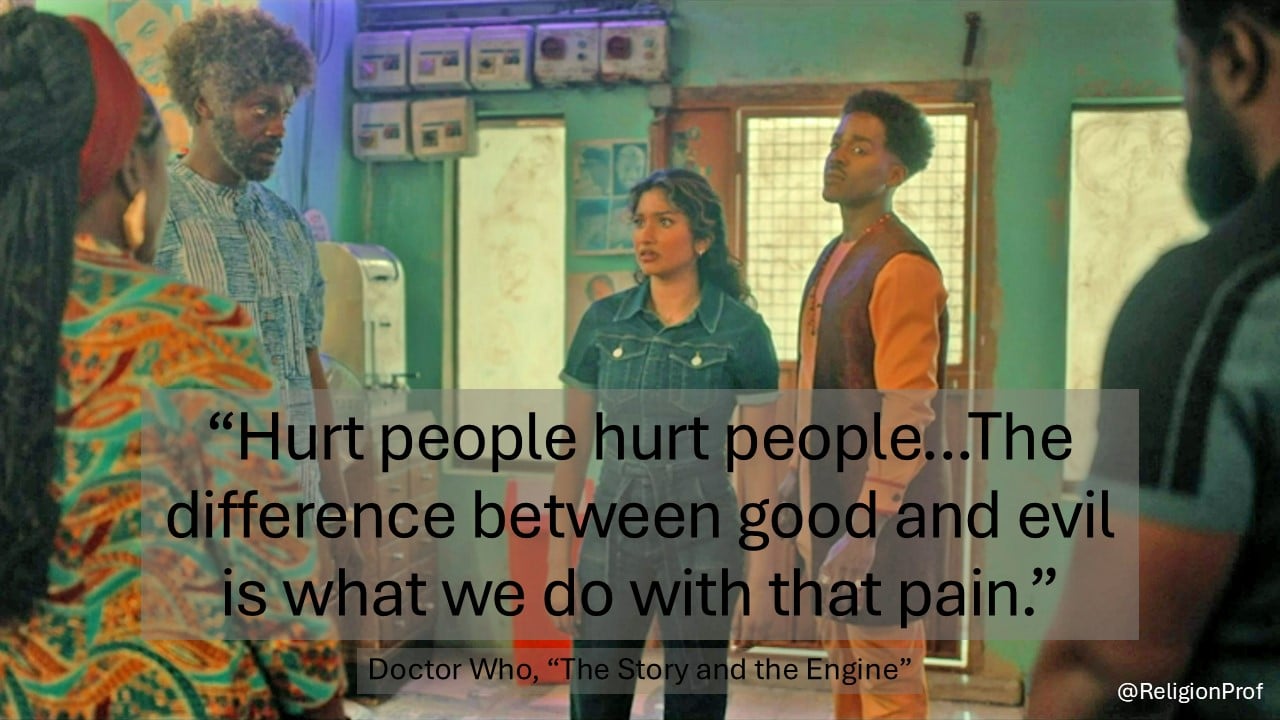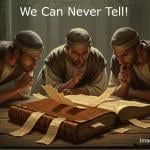The Story and the Engine is the latest episode of Doctor Who, and I’m once again exploring the episodes of this season out of order. Perhaps a better way to put it, given the focus of this episode, is to say that I’m not sticking to the narrative sequence of the story. As always, when an episode engages with religion, it gets my attention and calls out for commentary.
Stories about Stories

This episode is yet another in a long line going back to the early days of Doctor Who in which the Doctor’s travels intersect with the subject of story. In the Patrick Troughton era episode “The Mind Robber,” the Doctor found himself in the Land of Fiction, a pocket universe created by a human storyteller. In the Matt Smith episode “The Big Bang,” the Doctor uttered the famous line, “We’re all stories in the end.” And in the Peter Capaldi episode “Robot of Sherwood” there is exploration of the connections and differences between history, legend, and fiction. “The Story and the Engine” connects to that thread, as well as the one that runs back to the early days of Doctor Who right up through the most recent series, namely the Doctor’s encounters with the gods.
This episode features the Doctor visiting a place that he loves, a barber shop in Lagos, Nigeria, where he feels at home. While I was annoyed by the attribution of the Doctor’s ability to regenerate to his being “an evolved being,” I appreciated the direct mention of the fact that the Doctor, experiencing discrimination because of his current appearance, sought out a place where he is not treated differently.
On this visit, however, he finds that on his way to the barber shop called Omo’s Palace, he encounters a sign that says “Turn Back.”
The One Behind Them All
The next segment of the episode involves mystery followed by technobabble in classic Doctor Who fashion. A new barber has taken over the shop, and in some fashion the chair and clippers drain power from an individual as they tell a story while their hair is cut. It is eventually revealed that the shop is in outer space and Lagos at the same time. In space, they are on the back of a mechanical arachnid traveling a web, currently called “the Nexus,” but previously called the World Wide Web until humans gave that name to something much less interesting.
The barber claims to be Anansi, Dionysius, Loki, and various other deities, a being with many incarnations. The Doctor responds with scorn, saying, “I know the gods, you are not them. Who are you? Tell the truth.” The barber responds, “I was the one behind them all.” We thus are misled to wonder whether this might not be an even more powerful deity than those the Doctor had encountered thus far. But in fact, we learn that he was once human, a servant of the gods. He told the stories to feed the gods. He says the gods “only exist now because of me, my work.” Then he reveals that he built the story engine because, not being given credit by the gods for his work, he now seeks to destroy them.
Note that here we are not dealing with the gods that have managed to enter our universe recently, after the Doctor invoked a superstition on the boundary between universes. These are the gods of humankind, and that is the only explanation for why the Doctor responds to this man’s plan to “cut the gods out from the storyweb” by trying to stop him. Humans are tied to the gods, the Doctor explains. Getting rid of them (presumably meaning not merely defeating or killing them but causing them to never have existed) would harm humanity, would eliminate the means by which human culture is passed along.

Daughter of a Deity
We learn as well that Abi, the female companion of the barber is Abena, daughter of Anansi. She did not know that the man’s plan was to destroy the gods. Even though her father mistreated her, she decides to help the Doctor. Belinda quotes a famous phrase and adds her own additional insight in what should become a widespread meme: “Hurt people hurt people…The difference between good and evil is what we do with that pain.”
Abi then agrees to tell a story. She tells a story about slaves weaving maps into the braids of their hair, where slavemasters would not check and would not perceive the meaning. She weaves the map to freedom into the Doctor’s hair. The map in the Doctor’s weave leads to the story engine, which is surrounded by statues of gods not only from African tradition, but a Hindu statue is also visible. The story engine resembles a beating heart inside a brain (where else would stories live?) and also resembles a tree.
A God Learns from a Human
The Doctor mentions Hemingway and having challenged him to write the shortest story possible, which he accomplished in six words. (This is Doctor Who passing along a false rumor as history, which is obviously troubling.) The Doctor then offers his shortest story: “I’m born, I die, I’m born, I die.” The endless power of the Doctor’s life has the power to overload and destroy the engine. The Doctor says that the still-unnamed barber has put “7 billion lives at risk,” which makes little sense. Why would his actions only threaten the current population of planet Earth?
He challenges him to let go of his desire for vengeance: What would your 6 word story be? Don’t let this be how your story ends.
The man says, “I spent my entire existence serving the gods. What will I do now?”
Near the end of the episode, Abi says to Belinda about what she said earlier, “Hurt people hurt people”: “Imagine…a mortal teaching a god life lessons.”
Don’t Miss the Significance of This!
There is a significance to the appearance of Jo Martin as the Doctor in this episode that is either crucially important or poor writing. Even if it is the latter, it can be turned into the former by subsequent episodes. The Doctor vaguely recognized Abi but then when he realized who she is, he remembered when they had met, the full details of the bet her father had made and the way she had been treated. At that time the Doctor was a fugitive and could not take Abi along even though she wanted to go. What it is easy to miss is that this means that at least some memories from the Doctor’s earlier life that had been wiped have returned!
What do you think? Is this an intentional subtle clue to something that has been happening in the Doctor’s mind, or something done without the writer thinking through the significance? Either way, how do you think it will be resolved? Did you notice the significance of this right away?
Powerful Nonsense
Doctor Who has a tendency to tell stories that are emotionally powerful while also making little or no narrative sense if you inspect them closely. Although this is true already in the classic series, the effort to squeeze the backstory of all the characters in “The Story and the Engine” into a single hour-long episode exacerbates the problem. The weaving of characters telling stories into the episode allows for some information dumps to be given in narrative form. Yet the story of this episode – like the Doctor’s life story – is too big to be contained within this receptacle and threatens to overload it. (The story’s author was apparently cognizant of this, offering a prequel in written form.) Yet as so often, despite narrative issues, the story works symbolically in its engagement with humans as storytellers and how that relates to religion.
Theological Application
Theologically, I don’t know that there has ever been a systematic investigation of references to the divine in human writing as a powerful rhetorical tool, and to compare, contrast, and analyse how effectively this is done. Doctor Who is presumably correct that it is stories about deities that are what drives the engines of human cultures, creating stability or bringing about social change. A preacher saying “God demands…” will carry no weight without a story about the God who makes the demands. It is perhaps symbolic of this that Abena is more or less along for the ride with her human companion who is driving things, and yet it is her power that changes the story’s direction and brings it to its conclusion.
What did you think of “The Story and the Engine”? Please share your thoughts in the comments!













